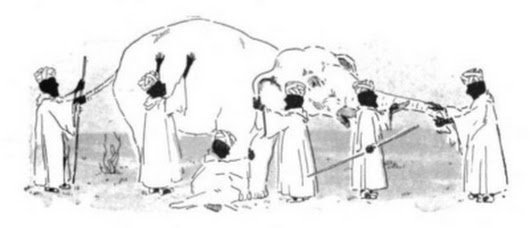Six Wise Men of Hindustan
There were six men of Hindustan,
to learning much inclined,
Who went to see an elephant,
though all of them were blind,
That each by observation
might satisfy his mind.
The first approached the elephant,
and happening to fall
Against his broad and sturdy side,
at once began to bawl,
"This mystery of an elephant
is very like a wall."
The second, feeling of the tusk,
cried, "Ho, what have we here,
So very round and smooth and sharp?
To me 'tis mighty clear,
This wonder of an elephant
is very like a spear."
The third approached the elephant,
and happening to take
The squirming trunk within his hands,
thus boldly up and spake,
"I see," quoth he,
"the elephant is very like a snake."
The fourth reached out an eager hand,
and felt above the knee,
"What this most wondrous beast
is like is very plain" said he,
"'Tis clear enough the elephant
is very like a tree."
The fifth who chanced to touch the ear
said, "E'en the blindest man
Can tell what this resembles most;
deny the fact who can;
This marvel of an elephant
is very like a fan."
The sixth no sooner had begun
about the beast to grope,
Than seizing on the swinging tail
that fell within his scope;
"I see," said he, "the elephant
is very like a rope."
So six blind men of Hindustan
disputed loud and long,
Each in his own opinion
exceeding stiff and strong;
Though each was partly in the right,
they all were in the wrong!

The story of the blind men and an elephant originated in India (Pali Buddhist Udana) from where it is widely diffused. It has been used to illustrate a range of truths and fallacies. At various times it has provided insight into the relativity, opaqueness or inexpressible nature of truth, the behavior of experts in fields where there is a deficit or inaccessibility of information, the need for communication, and respect for different perspectives.
Some versions of this story disclude the moral, which is as follows:
So oft in theologic wars,
The disputants, I ween,
Rail on in utter ignorance
Of what each other mean,
And prate about an Elephant
Not one of them has seen.
If one thinks of the elephant as a metaphor for truth or for the Divine and the six men as different perspectives of that truth it makes for an interesting train of thought. No religion is "wrong" just as none of the six men were wrong, they were just looking at it from different perspectives. As I was further ruminating on this parable I had another thought to add. In some versions of the story the blind men argue over which of them is right. I call that the human nature part of the story. In a perfect world or at least one not stunted by human nature, the six men might each take a turn at feeling the next part of the elephant, the part the man in front of them had just felt, and by expanding their environment and their experience they would come to understand more of the elephant, more of the truth or of the divine, whichever the metapohor was representing. If people could feel out other religions rather than approaching religion as a "my way or the highway" kind of a thing, there could be a better overall understanding of divinity and/or spirituality in general.
Sources:
http://equilibregaia.com/library/sufi-story-blind-men-elephant/
http://en.wikipedia.org/wiki/Blind_men_and_an_elephant
http://www.kheper.net/topics/blind_men_and_elephant/
Hi! I am a robot. I just upvoted you! I found similar content that readers might be interested in:
http://keepyourfeetontheground.weebly.com/religio-spiritual/six-wise-men-of-hindustan
Indeed, that is a link to my blog, you rock!
Great article
Congratulations @santosha! You received a personal award!
You can view your badges on your Steem Board and compare to others on the Steem Ranking
Vote for @Steemitboard as a witness to get one more award and increased upvotes!